“No question is more sublime than why there is a Universe: why there is anything rather than nothing.” – Derek Parfit
In my introductory post, I said that if certain statements in the bible are true, there would be evidence for God’s existence and glory in the realm of science and philosophy. The aim is not to provide proof for God’s existence of course, but to put forward the evidence and see whether belief in God is reasonable. To go in search of the fingerprints of a Creator.
And what better place to begin than the ultimate beginning!
The Big Bang Theory
 Perhaps unfortunately, the first thing that may have popped into your head after reading the heading above was a lounge-room scene of lovable geeks and cringe-worthy Sheldon Cooper one-liners. But the emergence of the Big Bang Theory of the early universe is actually one of the great scientific advances of the 20th century.
Perhaps unfortunately, the first thing that may have popped into your head after reading the heading above was a lounge-room scene of lovable geeks and cringe-worthy Sheldon Cooper one-liners. But the emergence of the Big Bang Theory of the early universe is actually one of the great scientific advances of the 20th century.
For hundreds of years, a beginning-less ‘steady state’ model of the universe was considered a viable theory of cosmology. But since the emergence of Albert Einstein’s theory of relativity and Edwin Hubble’s findings in the early 20th century, the idea of the universe existing eternally in the past has been done away with by leading scientists. The evidence of an expanding universe, the Cosmic Microwave Background, the galactic red shift, and the abundance of the light elements, have rightly made the Big Bang the widely accepted model of the early universe.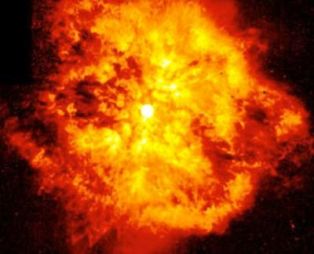
The standard Big Bang model describes a universe which is not eternal in the past, but which came into being around 13.7 billion years ago. All time, matter, energy and physical space came into existence at the Big Bang, literally from nothing.
“the coming into being of the universe, as discussed in modern science . . . is not just a matter of imposing some sort of organization . . . upon a previous incoherent state, but literally the coming-into-being of all physical things from nothing.” – P. C. W. Davies, physicist and co-Director of the Cosmology Initiative, Arizona State University
Even just few weeks ago, researchers from the Harvard-Smithsonian center for Astrophysics made a significant breakthrough in the understanding of the Big Bang, discovering further evidence of the rapid expansion of the universe.
As part of his research into cosmic expansion in 2003, Alexander Vilenkin concluded that in fact any model of the early universe, or indeed the existence of a ‘multiverse’ of which ours is a part of, would require a starting point, given the current evidence.
“With the proof now in place, cosmologists can no longer hide behind the possibility of a past-eternal universe. There is no escape: they have to face the problem of a cosmic beginning.” – Alexander Vilenkin, Director of the Institute of Cosmology at Tufts University
The standard Big Bang model
There have certainly been other theories posited in the last hundred years, though none have proved to be as viable as the classical theory of the Big Bang.
Stephen Hawking’s ‘no boundary model’ is an example of such a theory, described in part in his recent popular books. Although Hawking’s theory appears on the surface to evade the space-time origin question, he only does so using the concept of ‘imaginary time’, which has been repeatedly questioned as to its ability to describe the physical reality of the origin of the universe. Thus Hawking has not had much backing in using this principle to argue against an absolute beginning. His proposed theory still confirms the origin of real time and the real universe.
So, through more than eight decades of scientific advancement, the classical Big Bang theory still stands as the most scientifically validated and philosophically coherent explanation of the beginning of the universe, and as such is the model currently taught in our schools and universities.
But what does this have to do with the existence of God??
The transcendent cause
The reason the big bang is evidence for God is that things that begin need a ‘beginner’. Or to phrase it negatively, nothing comes from nothing.
You probably learnt this as a child, the first time you craved that ice-cream that your parents refused to buy you – things don’t just pop into existence out of nothing. It is a basic premise that out of nothing, nothing comes. Every new poem requires a poet. Every 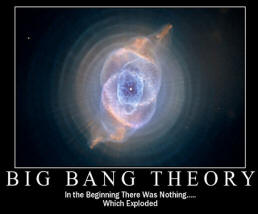 original masterpiece necessitates an artist. The origin of any new idea in your mind is only possible if you exist to think it up!
original masterpiece necessitates an artist. The origin of any new idea in your mind is only possible if you exist to think it up!
A recent attempt by Lawrence Krauss suggesting that our concept of ‘nothing’ isn’t actually nothing, has succeeded in confusing many but convincing few. ‘Nothing’ is not a complex state of quantum particles – that would clearly be ‘something’.
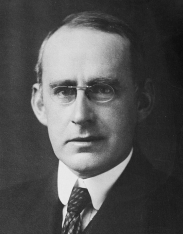 We can be confident in saying that because the universe began to exist, it has an external, transcendent cause. When asked the question of how the universe began, it is not sufficient to answer with ‘The Big Bang!’. There seems to have been something behind it.
We can be confident in saying that because the universe began to exist, it has an external, transcendent cause. When asked the question of how the universe began, it is not sufficient to answer with ‘The Big Bang!’. There seems to have been something behind it.
“The beginning seems to present insuperable difficulties unless we agree to look on it as frankly supernatural.” – Sir Arthur Eddington, British astronomer and physicist of the early 20th Century
The best explanation
So what then is the best explanation of the Big Bang? What is the nature of this transcendent Cause? I believe it to be an eternal, powerful and personal Creator, who brought the universe into existence out of his own volition.
Now maybe you’re like ‘Whoooaa that was a big jump – why does the cause have to be that?!?’. But let’s think about it for a minute… the Big Bang is the origin of all space-time. So the cause of the universe must be outside of space and time (something cannot cause itself to exist!). So this cause is beginningless, immaterial and unchanging.
The only things we know of which have these qualities are personal minds and abstract objects. But abstract objects (e.g. numbers) don’t have any power; they can’t cause anything to happen. They just are. So this leaves us with a personal mind as the most reasonable ultimate Cause. Only a personal Mind with freedom of will could be around forever and yet be able to produce a finite reality.
American William Lane Craig, the most prominent modern philosopher to put forward this argument for God’s existence, concludes with the confident assertion that a Creator is behind the origin of the universe.
“we may therefore infer that a personal Creator of the universe exists who is uncaused, without beginning, changeless, immaterial, timeless, spaceless, and unimaginably powerful.” – William Lane Craig, Research Professor of Philosophy at the Talbot School of Theology.
Through thousands of years of human thought, there remains no better explanation for the fact everything exists than the first four words of the bible.
“In the beginning, God…” – Genesis 1:1
Is there a more reasonable alternative, given the evidence? The most popular atheist alternative seems to be that the universe does not have an explanation for its existence, which can sometimes appear evasive.
“The universe is just there, and that’s all.” – Bertrand Russell
But the simple, elegant and awe-evoking hypothesis of a Creator God provides a reasonable alternative to an inexplicable, and ultimately meaningless, brute fact of the origin of the universe.
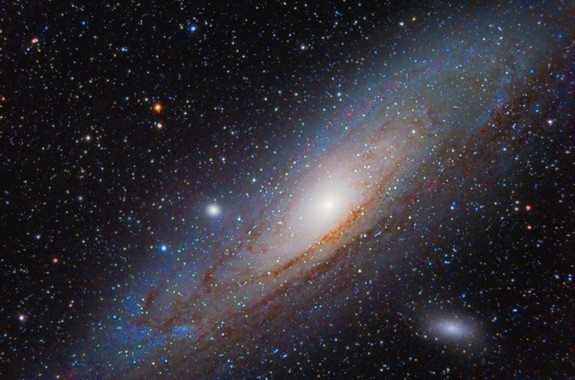
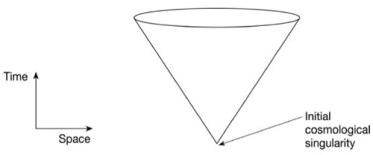
Nice post but I feel you cannot so simply discount Krauss’ view of nothing. The direct consequence of Heisenberg’s uncertainty principle is that in small timescales there is a large degree of inherent uncertainty in the energies of a system. Thus for very short time frames this can cause matter/antimatter pairs to temporary borrow energy from nothing before recombining due to the mass-energy equivalence. Therefore we could very well be looking at a universe in which the total energy is 0 due to gravitational energy cancelling out positive mass energy. However it is worth noting that this is only the case in a flat model of the universe and there is continued debate as to whether we exist in a curved or flat universe. Krauss’ argument then follows that if we do live in a flat universe with a total energy of 0 then it indicates a lack of ‘starting force’ or God. But if we were to live in a universe with positive energy, an open universe, then that would indicate an external force due to the law of conservation of energy which may well be a creator. Just some different models to consider.
Hi Ed, thanks for the comment. Interesting stuff.
I admit, I am no physicist, but I still find it very hard to believe that what Krauss describes is actually ‘nothing’. This gravitational energy and positive mass energy are clearly ‘something’. Energy is not nothing. A similar question was asked below. At best, the theory pushes the question back one step further – why does this energy, or the ‘metastable false vacuum’ exist? Is it somehow eternal? what evidence is there for that?
I find this quite fanciful to be honest, the standard big bang model seems far more plausible in light of the evidence.
“Or to phrase it negatively, nothing comes from nothing.” – You, you are basically trying to prove a claim by making another claim?
And even if we assumed for a moment, that your claim is true, then that’s still not “god” – and much less the specific god of your personal denomination.
And “personal minds” are “beginningless, immaterial and unchanging.”? Really? So, the mind of a baby exists before it was born, it exists seperate the brain and does never, ever change? Yep, sure, that totally makes sense and isn’t another unproven claim.
By stacking unproven claim upon unproven claim you hope to reach the point “god”. But in reality, it all crashes.
Hi Mr Mutant! Thanks for the comments. In response to each of your paragraphs:
1. I am simply describing the claim in another way here, not proving the claim in any way.
2. You are very free to not call such a being “god” if you like. All this argument proposes is the qualities that this being has (eternal, immaterial, powerful, free, etc). And you’re right – it is not evidence for the God of the bible alone, just a god in general.
3. I don’t believe I said this at all. Our personal minds are clearly not beginningless, you’re right.
4. Which claims in particular do you find hard to believe? I don’t think these claims are proved here, but just more likely to be true than false.
It’s not even an argument for a god, as, for example, an infinite metaverse (without any personality at all), which “spawns” universes, would also fit there.
And if I need to believe a claim, it’s pretty much worthless. The honest answer to “how did the universe start?” is “We don’t know (yet?).”. Trying to claim that the answer that some shepherd more than 2000 years ago made up because he didn’t know any better is true doesn’t make any sense. There’s much we don’t know – but trying to make “god” the answer for everything we don’t know is as good as making “Bubblegum” the answer.
Hi again, sorry for the delay!
1. An infinite metaverse which spawns would not fit with the argument I have put forward, as the big bang is the origin of all time and space and physical matter (this is also why it couldn’t have been bubblegum!). Also, even if the big bang model were rejected, one could just as easily ask what the origin of this ‘metaverse’ is. What created it? It simply gets pushed back until you get to something eternal and immaterial.
2. You say “If I need to believe a claim, it’s pretty much worthless”. This is simply not true! You believe in all sorts of claims! That World War 1 happened, that there is a brain inside your skull, that I am a real person and not a robot… etc etc etc. We all have many many beliefs. One of yours seems to be Atheism. One of mine is Theism.
3. This argument isn’t about anything Jesus said (who was a carpenter by the way, not a shepherd!), and so I don’t quote him – I quote modern scientists and philosophers.
The origin of the universe is not so ‘mysterious’ as I think you believe it to be – hopefully you have seen it is good evidence for a Creator!
1) So what? Nobody said anything about the nature of the metaverse. You assume it has to have time and matter… Why?
2) My beliefs are based on more than just stories. I have dozens of ways to check if WW1 happened. I have yet to see one for Theism. Some beliefs are falsifiable – others are not. The later ones are worthless.
3) Jesus didn’t say anything about the origin of the universe, as far as I know. The old testament is a tiny little bit older than big old Jesus – assuming he existed at all, of course.
1) You can call this being whatever you would like. All the argument explains is that it must be uncaused, beginningless, immaterial, spaceless, powerful and personal.
2) Both of our sets of beliefs are based on stories, other people’s testimony about what happened (e.g. WW1 – we weren’t there ourselves!). Our beliefs are also based on science, philosophy, experience, society, etc.
3) I’ll write a post on Jesus at some point, though I am struggling to find time at the moment! But as I said, this argument is not from the bible at all, but does support the claim that the bible makes – that an eternal and powerful God created the world.
1) Yes, and the argument is faulty, so what? If the argument claimed it was green, it wouldn’t change anything.
2) With WW1, I can go to various places, see the tanks, even dig for old shells, etc. It’s not just a story told by someone, I can actually find evidence lying around, if I wanted to. There are photos, graves, etc. What’s there for religion? Bingo, nothing of that – just the stories.
3) It tries to support. Big difference.
Vilenkin’s quote is from his 20006 book “Many Worlds in One,” in which two paragarphs later he states:
“Theologians have often welcomed any evidence for the beginning of the universe, regarding it as evidence for the existence of God… So what do we make of a proof that the beginning is unavoidable? Is it a proof of the existence of God? This view would be far too simplistic. Anyone who attempts to understand the origin of the universe should be prepared to address its logical paradoxes. In this regard, the theorem that I proved with my colleagues does not give much of an advantage to the theologian over the scientist. As evidenced by Jinasena’s remarks earlier in this chapter, religion is not immune to the paradoxes of Creation.”
Whether the universe can “come from nothing” is a matter of mathematics and physics, not semantic word games
View at Medium.com
Eddington died in ’44. Sean Carroll states that “the notion of a “cause” isn’t part of an appropriate vocabulary to use for discussing fundamental physics.” You won’t find the words “transcendent cause” in any book on particle physics, because it isn’t a useful concept to any modern physicists.
http://www.preposterousuniverse.com/blog/2014/02/24/post-debate-reflections/
Thanks for your comment!! Very helpful.
1. Yes, I’ve read this part of Vilenkin’s book too! it brings up an important distinction: I quoted Vilenkin when looking at the question of physics (did the Big Bang happen?). But we differ in our answer to the question of metaphysics (what is behind the Big Bang?). He concludes that the Big Bang is neither evidence for or against the existence of god, but I see it as clear evidence for god. I don’t see any actual support for how he answers this second question, but maybe I need to read more of his stuff to see!
2. Had a read of the article. The key seems to be this paragraph:
“At the heart of their thinking is Heisenberg’s uncertainty principle. This allows a small empty space to come into existence probabilistically due to fluctuations in what physicists call the metastable false vacuum”
Now here – the ‘metastable false vacuum’ is clearly something! He has at best moved the question back one step further – why does the metastable false vacuum exist? Is it somehow eternal? Krauss is labeling this false vacuum ‘nothing’, when it is surely obvious to all that this is a ‘something’!
3. I don’t really understand Sean Carrol’s argument. He says that ‘everyday notions of causation don’t apply to the beginning of the universe’. But why not? Craig’s response in the debate is very reasonable. Firstly, that it is a basic principle of metaphysics that things don’t pop into existence out of nothing. And secondly, why is the universe the only thing that can pop into existence out of nothing? Why not bicycles or Beethoven?? His argument that the causal principle doesn’t apply to the universe as a whole doesn’t seem convincing at all. All the evidence we have says the causal principle applies.
Thanks for the questions and links – very interesting!!
Sam.
Before the beginning of the universe, there was no time. How can “everyday notions of causation” apply without the possibility for something to happen before something else – or after? How can you expect to look around and then apply what you see NOW to something completely different (something that didn’t even happen in the universe)? You simply cannot apply rules that are valid for things INSIDE a set for the set itself.
I think the key here is to consider the alternative – that the universe popped into existence from nothing, without a cause. Is this possible? How? What evidence? There is certainly a lot of evidence for this concept of causality, in philosophy, science and our own experience. If the universe could appear randomly from nothing, why not other things? Why does this not happen now? It seems a very far-fetched and hopeful theory. It is even more far-fetched than the idea of magic, where at least there is a cause (the magician and his powers!). An event where something actually arises from nothing would surely be referred to as ‘supernatural’!
So I think the statement that ‘everything that begins to exist has a cause’ does not just describe everyday notions of causation, but is actually metaphysically necessary. It is a basic fact. The burden of proof surely lies with someone who claims that in this one instance we speak of, things can pop into existence uncaused, out of nothing.
Is it possible? Why not. Is it possible that a god created it? Or a myriad of infinite beings? Sure, why not.
Does that make any religion even one iota more likely? No.
The honest answer is: We don’t know. Quantum physics seem to indicate that something coming from nothing is indeed possible. Of course, that’s counter-intuitive – but anyone thinking that the universe has to be simple enough to be understood intuitively by himself has obviously worse problems than the beginning of the universe.
And so, no,, it is probably not even a basic fact INSIDE our universe – how can it be a basic fact OUTSIDE the limits of our universe? If there is no time, how can be there a cause? Nothing happens BEFORE anything – or AFTER – so how can something cause something else?
And no, I cannot prove anything, but neither can you. So, the ONLY honest answer is “We don’t know”. I know, Christians don’t like that answer and like to think that this somehow has to imply “goddidit” – but it doesn’t.